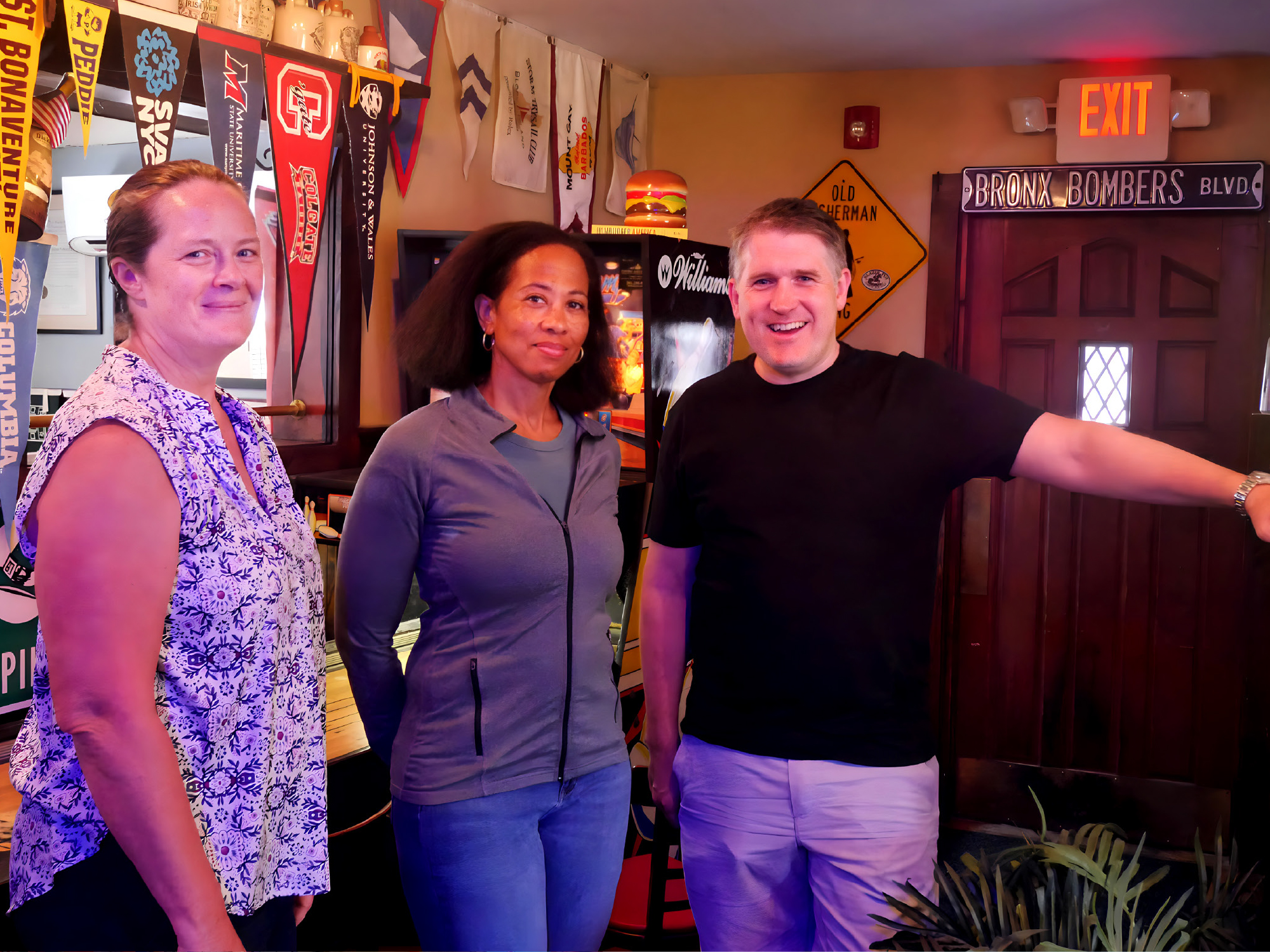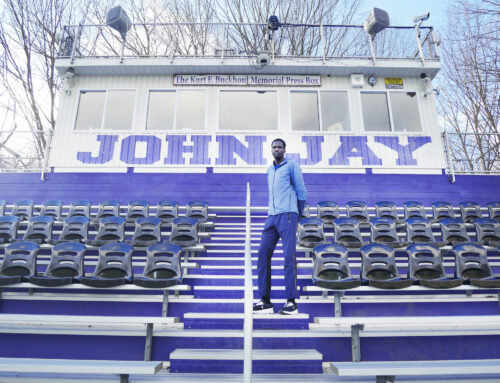Writing by Emily Meehan
Photography by Justin Negard
The parents:
Kristen Mcintyre, Mount Kisco, mother of Colin, a 15-year-old-boy in the dual language program
Alena Shifrin, Mount Kisco, mother of Gabrielle, a 14-year-old-girl in the dual language program
Andrew Weir, Mount Kisco, father of Harris, a 7-year-old boy in the dual language program
In the Bedford Central School District (BCSD), Mount Kisco Elementary School (MKES) offers students the opportunity to learn Spanish via its dual language program. The program is designed for students who are native English speakers and native Spanish speakers, and it begins in kindergarten. Children in the program spend 50 percent of their time learning in Spanish and the other half learning in English. Once they begin sixth grade, students take a Spanish Language Arts (SLA) class and a history class, both instructed in Spanish. After sixth grade, the students continue on with the SLA class.
Families living in the MKES zone are guaranteed entrance into the program, unless they decide to opt out. When a family decides to opt out, the district assigns the child to a different elementary school. For families living outside of the MKES zone, they must apply for the program. MKES does not prioritize admitting Spanish speaking students and has accommodated all families that elected to be in the dual language program to date. The inaugural dual language class is now in high school, and since the program began, it has sparked many conversations locally over the perceived benefits and drawbacks. We sat down with three parents whose children participate in the program (two are from the inaugural class). Although we asked, no one who opposes the program joined us.
Katonah Connect: In your experience, what are the biggest benefits of the dual language program?
Andrew: One of the things I want my kids to experience is being around people from different ethnic backgrounds. I’m a big proponent of empathy in people, far more than I am of education. Every school will teach them ABC and 123. My attraction to the school was always that my children can learn empathy and kindness, and they’ll understand kids from other backgrounds.
Kristen: The learning empathy part of the program is huge. And that’s why I feel like it’s something that could bring the community together. For example, we went on a field trip where a little boy who just moved here from Guatemala didn’t speak English. He got called on to go to the front of the class, and while the woman was talking to him, he was just standing there like a deer in headlights. And so a classmate turns to him and tells him what she’s saying in Spanish so that he can understand. They always look out for each other.
Alena: I knew that the earlier you introduce a second language, the better you acquire it. And I knew that it would enrich their life and develop skills that they’ll keep forever. When they offered Mandarin after school for my oldest child, I put them in. We used to watch Sesame Street in Spanish with my oldest child. I did any immersion I could find in another language to build more pathways in their brain; it results in higher scores across the board. To learn with the dual language program isn’t just about learning a language. It’s learning about a culture, which leads to integration, empathy and appreciation of each other.
Andrew: I used to almost tear up watching my son on the playground with these kids. First of all, he’s taller than almost every other kid in his class, and he has blue eyes and bright blonde hair, so he’s like the most distinctive kid. He runs around with these kids, and he doesn’t see any differences or hear any difference in these kids. His Spanish in the first year was incredible – they would all run around saying, ‘Mira, mira,’ because they had this playground chat, which was primarily in Spanish. He would also get invited to their birthday parties. My wife and I have often marveled and said, ‘Why did we ever, ever have any doubt that this was a good thing for our son?’ For the rest of his life, this will be one of his defining and enduring experiences in his early childhood development.
KC: Do you think the program benefits native Spanish-speaking children and families as well?
Kristen: Yes. On a Spanish day, the Spanish kids get to help the English kids. It’s building their self esteem because they get to help be in charge for once, instead of being carted off to another room, segregated from everybody and having no friends – because that’s how it used to be.
Alena: In Gabby’s grade, when I chaperoned field trips, I saw kids speaking Spanish and English throughout the day, totally mixed and fully integrated. No matter what the subject was, they could be talking about race cars, they could be talking about reality TV, whatever it was, it was fully integrated. It’s not like that with my older child’s grade.
Plus, the Spanish speaking parents in my older kid’s class didn’t really feel as if they could participate in the field trips, cook offs, bake sales and so on because there’s a huge language barrier. But in Gabby’s class, moms come in for fundraisers and other school events because the kids can translate. The teachers also help with translations, so that’s another way it integrates the parents. I got to know the Spanish speaking parents much better in Gabby’s class than those in my older kid’s class.
Kristen: These families that never participated in any school events because it’s stuff like hot dogs and baked beans are now bringing empanadas and all of their food. They’re celebrating their heritage and introducing us to their cultures and it’s just amazing. They’re so happy to be there and be able to share.
KC: Some parents have expressed concerns about the program, such as lower test scores or learning difficulties. Have your children experienced this or was/is that a concern of yours?
Andrew: Keep in mind the standardized testing is in English. So when the test scores are printed on Zillow, people see that your elementary school is five out of ten, they don’t take into account kids who are taking tests in a language that they only started speaking a handful of years ago. When they separate the data and take out all of the kids who effectively spoke no English until elementary school, MKES actually has the highest standardized test scores in the district.
KC: Do you think speaking Spanish will help your child succeed down the road?
Andrew: Mandarin and Spanish are the top spoken languages in the world. If you want your kid to be successful beyond the end of your block, this is a really good way to do that. You can name 100 jobs where a teenager is going to be more employable if they speak more than one language.
Kristen: When my son applied for a job at the bike shop in Mount Kisco, one of the questions was, ‘Do you speak any other languages?’ He was able to say, ’Yes, Spanish.’ When people come in, and they only speak Spanish, if he’s there, guess what? They have an instant translator.
Alena: We recently went to Argentina over winter break; my daughter made it clear that she wasn’t going to be our translator. But after watching my husband and I butcher Spanish, she was like, ‘Okay…no.’ And from then on, she said, “I’m going to be the translator.” Everywhere we went, she said, “Mi familia no habla Español.” She loved to say, “Speak to me, I’m the translator.” And her confidence just grew.
And in the future, it will definitely help her get a job. When I was interviewing for jobs as a social worker, one of the questions at every place was, “Do you speak Spanish?” I didn’t need a higher degree. I didn’t need a doctorate. What they wanted was someone who spoke Spanish.
KC: At MKES, the dual language program is offered as an English and Spanish program, but New Rochelle offers an Italian and English program in addition to their Spanish and English program. P.S. 58 in Brooklyn offers a French and English program, and St. Michael’s Catholic Academy in Brooklyn offers a Mandarin and English program. Do you wish that other options were available at MKES?
Kristen: It would be great, but I don’t see the need here. We have a very large population of Spanish speaking families, so it makes sense to have that as the second language.
Alena: I would love it if we could have those choices. I think learning any other language at a young age is beneficial to the developmental brain. However, I see Spanish in this country as more of a co-language and it’d be great if we could all learn both Spanish and English.
KC: Any final thoughts?
Kristen: I’ve stood in front of the school board because I was asked to by other parents in the program. I hate public speaking, but I couldn’t not do it. I had to do it because it was that important, and it wasn’t just important because my son was learning a second language. It was important for our communities above all else. We have to change the narrative in the district, period. Because it’s all the people who have no idea what the program is about that speak out against it.
Andrew: Real estate agents sell houses on the promise that you don’t need to go to MKES. You know the old saying, ‘You have to walk a mile in someone else’s shoes,’ nobody should be allowed to comment on our school until they’ve walked in the building. If you’re just looking at face value, or based on all the noise and negative rhetoric, of course, you almost can’t fault them for having those misconceptions about the school.
What if the real estate agents flipped the script and instead advertised in the listing that there’s a dual language school? Because in Rye, Mamaroneck and Larchmont, people are on a waiting list to get into those schools! There are two dual-language schools in southern Westchester where there are lotteries to get into them. What has gone so wrong here that people think it’s a poison pill?
Alena: There are a lot of people like us, and we need to kind of ignore that loud minority. There are a lot of people like us out there, and we could come together a little more. I love your idea of rebranding it and the real estate agents being unapologetic and bragging about what we have, Andrew. There are people who will be receptive to that.
Andrew: I get messages from people I haven’t talked to in 10 years saying, ‘Hey I see you live in Mount Kisco, we’ve heard about the dual language program.’ We’re incredibly proud of what the school district is doing, and the district shouldn’t apologize for it.
This article was published in the September/October 2023 print edition of Katonah Connect.

Emily Meehan
Emily Meehan is a college student who is passionate about music, art and writing.










